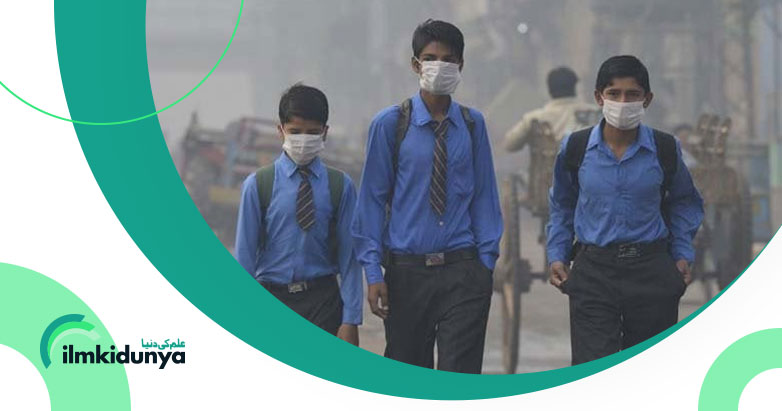The Punjab government has taken urgent action in response to the rising smog crisis affecting major cities, especially in Lahore, Sheikhupura, Gujranwala, Multan and Faisalabad. With pollution intensities reaching hazardous levels, officials have implemented several emergency measures to protect public health. And it will also affect students, the government of Punjab has announced the closings of schools in Punjab for a certain period of time. The schools and institutes will be closed for primary to higher secondary students and government has also advised citizens to take necessary precautions to avoid getting affected by the smog. You can get to know more about this smog notification of schools closing further below from this page.
Schools Will Remain Closed Until 17th November
To protect students from the harmful effects of smog, the Punjab government has ordered the closure of all educational institutions from primary to higher secondary levels until 17th November 2024. This closure applies across Lahore, Gujranwala, Faisalabad and Multan divisions, where the air quality index has hit alarming levels, reported reaching above 1100 AQI in some areas. Student are also advised to use masks every time they go out. To ensure student’s education is not interrupted, schools in the affected divisions have been directed to conduct online classes through zoom meeting during this period. These necessary measure aims to keep students safe indoors while continuing their studies.

Masks Mandatory and Restricted Outdoor Movement
Due to the high levels of pollution and smog conditions, wearing masks has been made mandatory in public areas to reduce the risk of inhaling toxic pollutants. Senior provincial minister Maryam Aurangzeb urged citizens to avoid going outside whenever possible and to use face masks if they must go out. This recommendation is especially critical for individuals with respiratory conditions, children and the elderly alike.
Reduced Attendance in Private Offices and Virtual Meetings
To limit outdoor exposure, the government of Punjab has restricted attendance at private offices to 50%, encouraging remote work wherever possible. Additionally, all official government meetings are now being conducted via Zoom, reducing the need for staff to commute and lowering air pollution from transportation. This is Punjab government's swift response to the smog crisis highlights the serious health risks associated with poor air quality.
Smog Control Efforts by Government Departments
To address the root causes of smog, the Punjab government has mobilized various departments to monitor and control air pollution. A centralized control room equipped with modern air quality monitoring devices has been set up to continuously monitor the air quality index (AQI). Departments have been assigned specific roles to tackle pollution sources, with a focus on reducing emissions that contribute to smog.
The government has identified the Eastern Wind Corridor as a significant contributor to the smog crisis. This corridor allows polluted air to enter Punjab from neighboring areas, compounding the smog problem. Smog levels have also been intensified by crop residue burning, which contributes to high methane levels in the air.
Collective Efforts are Needed
Minister Maryam Aurangzeb highlighted the need for joint efforts between Pakistan and India to address regional air pollution, as both countries share atmospheric effects from smog and crop burning. Due to cross-border wind patterns, pollutants from Indian regions like Rajasthan are affecting air quality in Punjab cities, especially Multan and Gujranwala.
Banning of Plastic Bags and Crop Residue Burning
To reduce pollution from common sources, the government has reinforced bans on plastic bags, fireworks and crop residue burning, which are often violated. These practices release harmful particles and methane gas, worsening the smog condition. The government has urged citizens to comply with these regulations to lessen the health risks.
Precautions to Avoid Harmful Smog Effects
High smog levels can have serious health impacts, including respiratory issues, eye irritation and aggravated asthma. Pakistani citizens are advised to take the following necessary precautions:
1. Wear masks at all times when outdoors.
2. Avoid outdoor activities during peak smog hours.
3. Keep windows and doors closed to reduce indoor exposure to smog.
4. Use air purifiers indoors if available.
5. Stay hydrated and maintain a healthy diet to strengthen immunity.
Expected Duration of the Smog Crisis
According to the latest reports, the current smog intensity is expected to persist for about ten days. The Punjab government will continue to monitor the situation closely and implement further measures if necessary. However, long term improvements in air quality will require collaborative efforts and strict adherence to pollution control regulations by both citizens and the authorities.
Related News
-
 28-Mar-2025
28-Mar-2025newsheading

.gif)



















